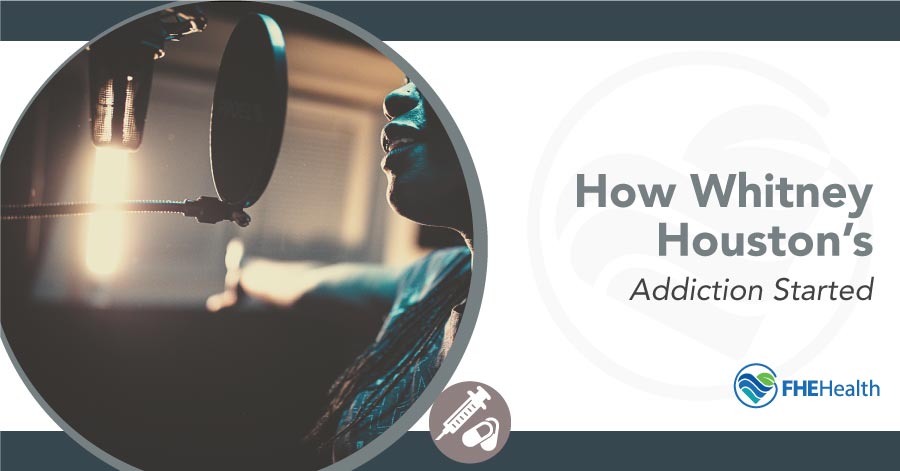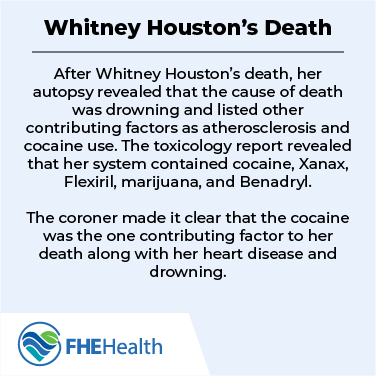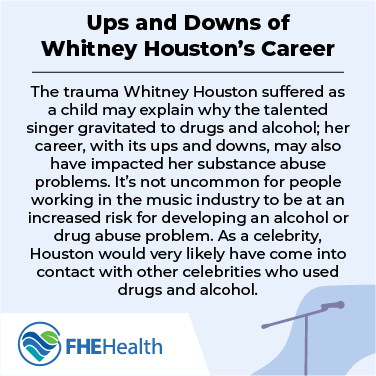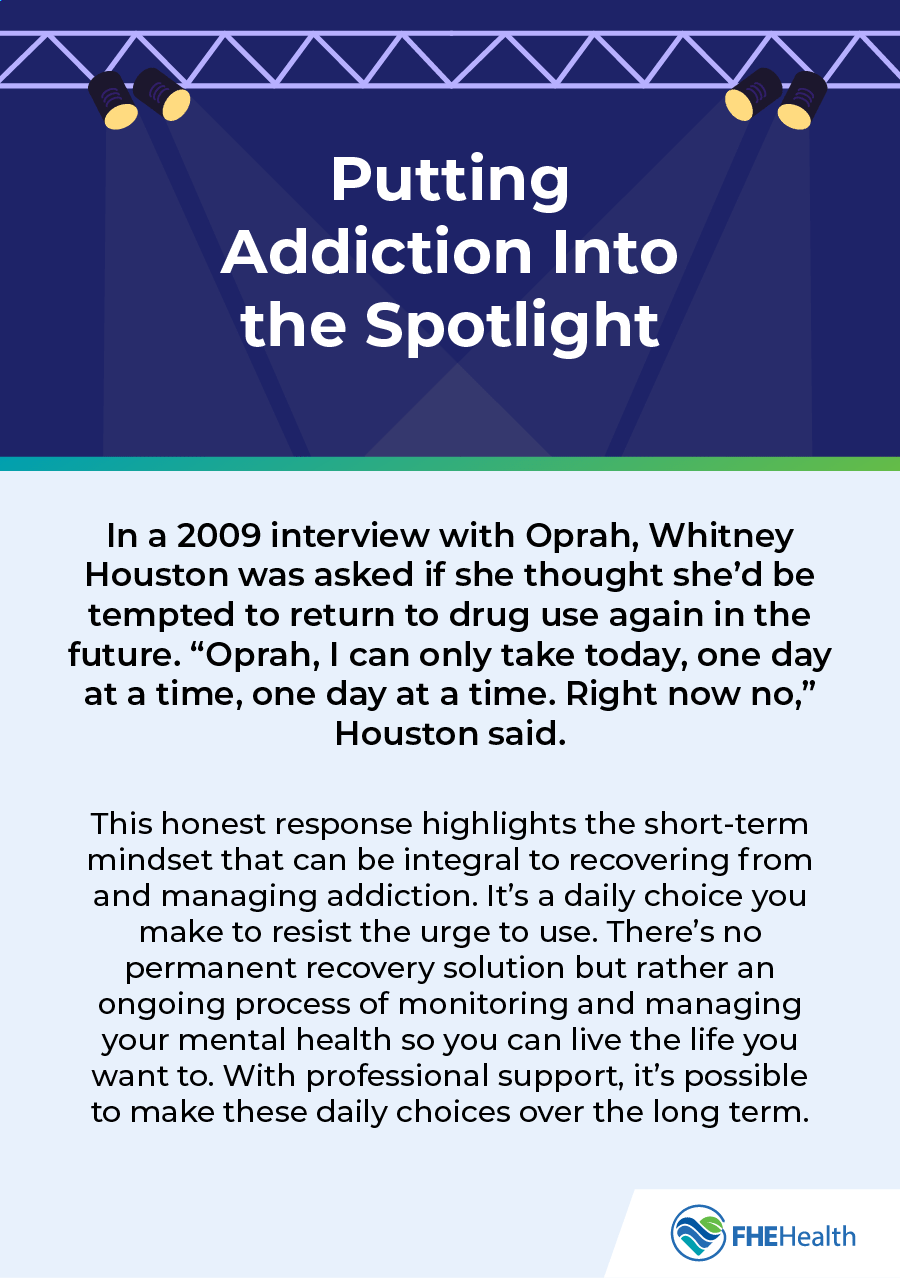
The late Whitney Houston is a pop culture icon, so much so that even without using her last name, people know who you’re referring to. Her legendary vocals have left a lasting mark on the music industry, even in the wake of her tragic death in 2012. While her life looked glamorous to an outsider, Whitney struggled with substance abuse and addiction that ultimately resulted in her passing. It’s critical to shine a light on Whitney Houston’s addiction and the brave battles with addiction that public figures are fighting to start a positive conversation around seeking help if you need it.
Whitney Houston died on February 11, 2012. The official autopsy report declared her cause of death as accidental drowning, heart disease and cocaine use.
View this post on Instagram
What Was Reported in Whitney Houston’s Toxicology Report?
 After the singer’s death, her autopsy revealed that the cause of death was drowning and listed other contributing factors as atherosclerosis and cocaine use. The toxicology report revealed that her system contained cocaine, Xanax, Flexiril, marijuana, and Benadryl. The report listed a substance found in the singer’s liver called cocaethylene, which is formed when the individual uses both cocaine and alcohol. The coroner’s report also stated that drug paraphernalia was found in the singer’s hotel bathroom where she died and an open bottle of champagne and beers were found in the room itself.
After the singer’s death, her autopsy revealed that the cause of death was drowning and listed other contributing factors as atherosclerosis and cocaine use. The toxicology report revealed that her system contained cocaine, Xanax, Flexiril, marijuana, and Benadryl. The report listed a substance found in the singer’s liver called cocaethylene, which is formed when the individual uses both cocaine and alcohol. The coroner’s report also stated that drug paraphernalia was found in the singer’s hotel bathroom where she died and an open bottle of champagne and beers were found in the room itself.
After the toxicology report was released, headlines were quick to mention that the singer’s system contained a cocktail of drugs and alcohol, but the coroner made it clear that the cocaine was the one contributing factor to her death along with her heart disease and drowning.
Did the Singer Suffer from Trauma?
 Many people with substance use disorders have experienced or witnessed trauma in their past. Trauma is frequently a contributing factor in the development of an alcohol or drug abuse problem, and the distress that it triggers typically remains a trigger to abuse drugs or alcohol until the individual is able to manage it. According to biographical details about Houston’s childhood, she and her brother were allegedly sexually abused by a family member when they were children. However, the abuse was hushed up.
Many people with substance use disorders have experienced or witnessed trauma in their past. Trauma is frequently a contributing factor in the development of an alcohol or drug abuse problem, and the distress that it triggers typically remains a trigger to abuse drugs or alcohol until the individual is able to manage it. According to biographical details about Houston’s childhood, she and her brother were allegedly sexually abused by a family member when they were children. However, the abuse was hushed up.
Childhood trauma leaves someone at increased risk for developing a drug and alcohol problem. The fact that Houston did not get therapy at a young age or even confide the abuse in her mother very likely left her with immense unresolved emotions related to her traumatic past.
However, the singer’s traumatic experiences were not contained by her childhood. Those close to her have revealed how criticisms about her image left her feeling vulnerable and disheartened. Houston had often been accused of “white washing” herself by the African American community for her image and career choices.
Her marriage to Bobby Brown was incredibly tumultuous as evidenced by repeated headlines about his infidelities. Houston’s assistant reported how driven she was to keep her family together. Even so, the stress of ongoing career and family struggles could easily be viewed through the lens of trauma. Houston did not lead a life of calm and serenity. Of course, many people do not, but for someone with unresolved trauma and addictions, that trauma remains a powerful trigger to use–and keep using.
Whitney Houston Addiction: In Her Own Words
Whitney Houston’s addiction was not always in the public eye, and for a long time, it was a topic of speculation. While cocaine use played a role in her death, Houston once spoke about the fact that her addiction and drug use were not intended as methods of self-harm.
“I can tell you that I am not self-destructive. I’m not a person who wants to die. I’m a person who has life, who wants to live. And I always have. And I wouldn’t mistake it for anything else other than that,” she told Diane Sawyer in 2000 during an interview on Primetime. Houston’s love for life and simultaneous struggles with addiction make her death as a result of cocaine use even more tragic.
In a 2009 Oprah interview, Whitney spoke about her prior drug use. The singer went through three rehab stints in 2004, 2005 and one final time in 2011. “We were lacing our marijuana with base. We weren’t on crack. We weren’t on no crack stuff,” Houston told Oprah, “We weren’t buying $20 jumbos. We were paying money. We were buying kilos and ounces and ounces. We would have our stash.”
When Oprah asked Whitney if using drugs provided her with relief, she replied, “At times. Don’t forget, there were some times we’d laugh our tails off. We had a ball. Sometimes you do have a good time. But when it gets to the point where you’re sitting in your home and you’re just trying to cover what you don’t want people to know, it’s painful. And then you want more just so that you don’t let anybody see you cry. Or anybody to see we’re not happy.”
While she openly discussed her prior drug use in the 2009 interview, when Oprah asked Whitney if she was currently drug-free, Houston replied, “Yes ma’am. I mean, y’ know, don’t think that doesn’t mean I don’t have desires for it. There are times it take a minute to cleanse, get off, get off me — I have to pray it away.”
Houston speaking so candidly about her ongoing struggles with addiction is an important message to share. While a stint in rehabilitation or therapy can get you clean and sober, addiction is a mental illness that doesn’t simply go away. Though it can be managed to ensure you live an enriching life, it’s common for individuals struggling with addiction to relapse and to battle with the constant push and pull of the desire for the feeling substances give you.
Putting Addiction Into the Spotlight
 In the same 2009 interview with Oprah, the talk show show host asked Whitney if she thought she’d be tempted to return to drug use again in the future. “Oprah, I can only take today, one day at a time, one day at a time. Right now no,” Houston said.
In the same 2009 interview with Oprah, the talk show show host asked Whitney if she thought she’d be tempted to return to drug use again in the future. “Oprah, I can only take today, one day at a time, one day at a time. Right now no,” Houston said.
This honest response highlights the short-term mindset that can be integral to recovering from and managing addiction. It’s a daily choice you make to resist the urge to use. There’s no permanent recovery solution but rather an ongoing process of monitoring and managing your mental health so you can live the life you want to. With professional support, it’s possible to make these daily choices over the long term.
Whitney evidently returned to cocaine use in 2012, with it playing a role in her tragic and untimely death. As a legend in her own right, Houston inspires millions of people around the world to pursue their musical dreams, but her message now runs even deeper. In her wisdom, Whitney taught that it’s okay to speak out about addiction and it’s a positive thing to seek professional help. She also led by example in knowing that recovery is an ongoing process that requires continual commitment.
The Incredible Life of Whitney Houston
Whitney Houston was an American singer born in New Jersey in 1963. Her voice is her legacy, and she released the first of four iconic albums at the young age of 22 in 1985, starting off strong with three singles hitting No. 1. Whitney was born into a musical family, with both her mother and her cousin being notable gospel singers. Her mother, Cissy Houston, was the reason Whitney began singing gospel music in church from a young age.
The way the congregation reacted to her voice instilled confidence in Whitney and led to her passion for pursuing music as a career. “I think I knew then that [my singing ability] was an infectious thing that God had given me,” she told Diane Sawyer in an interview.
It was in 1992 that Whitney married Bobby Brown, and at this time, her career began to derail as a result of substance abuse. The pair ultimately divorced in 2007, but their relationship was thought to be toxic, tumultuous and a significant influence in Whitney’s drug addiction.
Ups and Downs of Houston’s Career
The trauma Houston suffered as a child may explain why the talented singer gravitated to drugs and alcohol; her career, with its ups and downs, may also have impacted her substance abuse problems. After all, work stress is also a contributing factor for drug and alcohol abuse. It’s not uncommon for people working in certain industries and careers to be at increased risk for developing an alcohol or drug abuse problem.
As a celebrity, Houston would very likely have come into contact with other celebrities (i.e. such as her husband) who used drugs and alcohol. But proximity to addictive substances alone wasn’t the only risk Houston faced as a world-famous performer. Her own career with its achievements and failures also likely affected her substance abuse problem.
Houston’s career began to decline as news about her drug use emerged in headlines. Her marriage with its violence and infidelity also began to redefine her image. Having been treated to a “squeaky clean” Houston brand for so long, many people were surprised and dismayed by Houston’s actual lifestyle once it surfaced. In many respects, she never regained a positive image with the mainstream public again. That ‘fall from grace’ would have been stressful if not traumatic to contend with.
If You’re Struggling, Seek Professional Support
If you’re dealing with drug addiction or substance abuse, you’re not alone. At FHE Health, we can help you create a treatment plan and support you through recovery to get back on track. Whether you’re struggling with drug addiction, behavioral addiction or alcohol addiction, our team is here for you. Call us today at (833) 596-3502. We can take your call 24/7.






